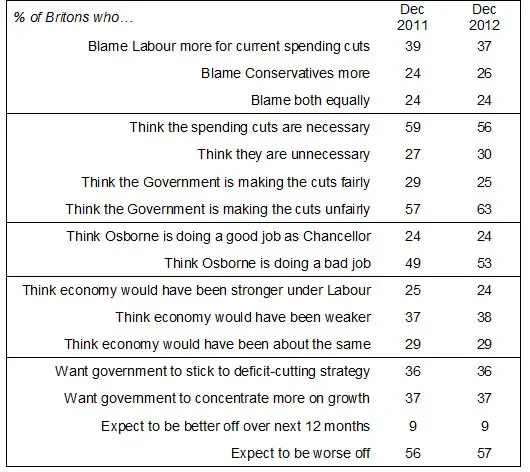2012 has been groundhog year: YouGov President, Peter Kellner, analyses
Pollsters, like economists, social scientists and other data-watchers, thrive on change. When the numbers move, we have plenty to say. Sometimes, however, people, and therefore the data, let us down. This is one of those occasions. As far as the big picture is concerned, public reaction this year to Britain’s continuing economic troubles has been remarkably static. 2012 has been groundhog year.
Want to receive Peter Kellner's commentaries by email? Subscribe here
In the past few days, YouGov has conducted post-Autumn Statement surveys for The Sun and the Sunday Times. These are some of our findings, and how they compare with a year ago:

Twelve months ago, we tended to think that spending cuts were necessary, that Labour was more to blame for them than the Conservatives, that George Osborne was a poor chancellor acting unfairly and that our own financial prospects looked bleak. However, we were unconvinced that a Labour government would have done any better, and we were divided about the merits of sticking to plan A – cutting the deficit – versus those of plan B – shifting policy to concentrate more on economic growth.
Identical observations apply today. Slightly more people think Osborne is a bad chancellor who is acting unfairly; but the differences are slight. Despite this year’s disappointing economic figures – with its double-dip recession and with austerity now likely to last longer than originally expected – there is no massive clamour for Labour’s alternative strategy. The public mood looks sullen rather than angry. For the moment we seem resigned to our fate rather than determined to storm the barricades.
Despite his poor personal ratings, Osborne can be relieved about this. Indeed, he and his policies are less unpopular than they were in the summer. In August just 14% thought he was doing a good job as Chancellor: a ten-point rise since then, to end up where he started the year, is not to be sniffed at.
Indeed, other YouGov data suggests that consumers are slowly climbing out of the trough of despond into which they sunk last year. We track consumer confidence monthly in our Prosperity index and HEAT (Household Economic Activity Tracker) series for subscribers. These suggest that, as with economic output, there has been a double-dip recession in consumer confidence. But whereas the first dip, in 2008-9, coincided with the economic output data, the second dip in consumer confidence started earlier, in mid-2010. By the autumn of 2011, just as the ‘real’ economy was turning down once more, consumer confidence was beginning to turn up.
The recovery is weak and faltering. Whether looking at income or spending expectations, more people still expect things to get worse rather than better. But the margin is narrower than it was 18 months ago. It’s not so much that we are cheerful, but that our mood is not as bleak as it was.
These figures prompt the question: why have the economy and consumer confidence figures moved in opposite directions this year (albeit only slightly in both cases)? My guess – come back in five years’ time and I’ll tell you for certain – is that consumer confidence is more closely aligned these days to employment trends and house prices than gross domestic product. This year has seen something between stability and resilience in both the housing and jobs markets. The unemployment figures have certainly surprised many economists this year by gradually falling. Many of the new (and saved) jobs may be low pay and part-timed; but we should not be surprised if the biggest driver of consumer confidence in tough times is the extent to which people have, and continue to expect, a regular income, and are free from the fear of negative equity.
Here’s another possibility (and both things can be true). We are getting used to austerity. Our ability to cope has been squeezed but not punctured. We fret about public spending cuts, but our schools stay open, the NHS continues to treat patients, the police still fight crime. Maybe our public services are struggling to keep going. Maybe the worst is yet to come. But daily life for most of us does not (yet?) feel very different from how things were before Northern Rock and Lehman Brothers collapsed.
This does not mean everyone is prospering, or even making ends meet. This is plainly a bad time to have to rely on welfare benefits, or to enter the jobs market with few qualifications, or to climb onto the first rung of the housing ladder. One of today’s more depressing signs is the proliferation of those TV ads for short-term ‘payday’ loans on interest rates of up to 2,000%.
However, most of us are getting by. If this pattern continues, then Britain might find itself in a virtuous circle, with a gradual further recovery in consumer confidence underpinning a recovery in economic output – which in turn generates more jobs, supporting a further rise in confidence and yet more economic growth.
On the other hand, it would not take much to disrupt our fragile recovery. Osborne must be hoping that the European and wider world economies provide no more shocks, and that schools, hospitals and the police continue to avoid deep cuts in the way they teach, treat and protect us. If things go wrong, the Government will be in trouble – but for millions of us, and for the health of the wider economy, political turmoil at Westminster would be the least of our problems.
See the full survey results and details here for the Sun
See the full survey results and details here for the Sunday Times
Want to receive Peter Kellner's commentaries by email? Subscribe here








